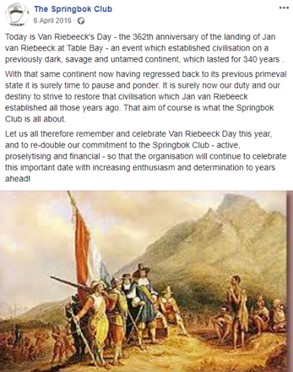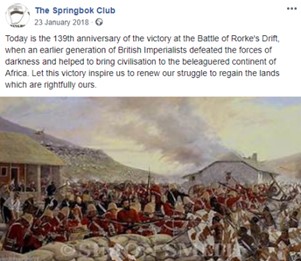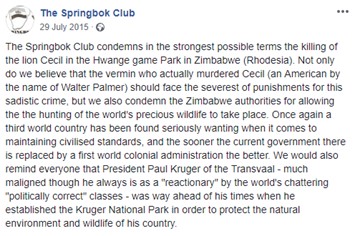15-minute read
Dermot Feenan
LLB MA LLM Barrister-at-Law FRSA
.
This is an edited version of the Twitter thread published on 17 April 2019.
.
On 16 April 2019, The Guardian reported revelations by the London-based anti-racist charity Hope not Hate that Stuart Agnew, a member of the UK Independence Party (UKIP), and one the party’s MEPs, gave a speech at the Springbok Club – a group that supports both former apartheid South Africa and white-led Rhodesia.
Agnew’s talk at the Springbok Club on 6 April reflects UKIP’s increasing shift to the far right, as this exposé of the Club and account of UKIP’s accompanying activities shows.
The Springbok Club
The Springbok Club was formally constituted in 1999. Its constitution states that the Club’s objectives are:
(i) To bring together those Southern Africans living in exile and others who support the aims and objectives of the organisation on a regular social and informative basis.
(ii) To inform those of a similar background still living on the African continent of our support for their rights and liberties, and our concern for the current dangers which they may be facing.
(iii) To lobby the powers that be in the outside world concerning the anarchic state of current day Africa, and to advocate that steps be taken to restore civilised rule to the continent.
The Club has no formal premises. It tends to hold its meetings in pubs around the south of England. It also arranges a series of social events annually, including commemorations of colonial and white history in South Africa and the former state of Rhodesia.
The Springbok Club has a website and a Facebook page. Its chair and organiser, Alan Harvey, tweets about the Club’s activities through his own Twitter account ‘@EmpireLoyalist’ and personal Facebook page. The Guardian notes that Harvey is a former activist in the National Front, a far-right, fascist organisation that rose to prominence in the 1970s in the United Kingdom (UK). Harvey emigrated to South Africa in the 1970s but returned to the UK following the end of the apartheid.
Springbok Club commemorative events
The Springbok Club’s website shows that it has regularly celebrated ‘UDI Day’, named after Southern Rhodesia’s Unilateral Declaration of Independence (UDI) from the UK in 1965. Southern Rhodesia had until then been a British territory. Following World War II many African countries sought independence. Southern Rhodesia had been self-governing since 1923. The government wanted independence. It was comprised largely of members of the white population, which constituted five per cent approximately of the population. The UK refused to grant independence because of the principle of “no independence before majority rule”; which would likely have pushed whites out of power. During negotiations between the governments of the UK and Southern Rhodesia, Ian Smith, Prime Minister of the latter country, declared UDI when it became clear that the UK would not alter its position. The UK, the Commonwealth and the United Nations deemed Rhodesia’s UDI illegal.
The Springbok Club also celebrates Van Riebeeck’s Day to mark the landing of Dutch colonial administrator Jan van Riebeeck in southern Africa in 1652. The Club stated in 2016 that the landing “established civilisation on a previously dark, savage and untamed continent”.

The Springbok Club’s Facebook post celebrating Van Riebeeck’s Day continues: “With that same continent now having regressed back to its previous primeval state […] It is surely time to restore that civilisation.”
Van Riebeeck’s Day was celebrated as a public holiday under the apartheid regime in South Africa. It was abolished after the country’s first democratic general election in 1994.
The Springbok Club’s embrace of the ideology of superior western ‘civilisation’ is also evident in its celebration of the Battle of Rorke’s Drift in which British Forces repelled a Zulu attack following its invasion of Zululand in 1879 in order to extend British imperial influence in southern Africa. A post on the Club’s Facebook page refers to “British Imperialists” defeat of “the forces of darkness” (see below).

The reference to “forces of darkness” allows an obvious racist interpretation, which is reinforced by the Club’s subsequent statements; including in its commemoration of the ‘Day of the Vow’ (illustrated in the post below). The commemoration marks the day when Voortrekkers took a vow before the Battle of Blood River against the Zulus in 1838 that in return for victory they would build a church and keep the day as a holy Sabbath. The Voortrekkers won the battle.

The post conveys a myth that has sustained white-supremacist imperialism: that defeat of the native black populations arose from divine support. It was exploited by some Afrikaners throughout the apartheid era. After apartheid, the day was renamed ‘Day of Reconciliation’.
Pro-apartheid and white re-colonisation
The Springbok Club also states on its website that its Northern Ireland Branch ensures that “real South African flags are displayed in the streets during the marching season” – referring to the notorious ‘Apartheid Flag’; replaced at the beginning of South Africa’s general election in 1994.
In a speech given at the launch of the Club, Alan Harvey said after setting out the objectives of the Club: “if there is any ambiguity in anyone’s mind then the presence of the real South African flag on our logo should leave no-one in any doubts.”
The Springbok Club supports white re-colonisation, as evident in this final Facebook post alleging “third world” governance of Zimbabwe, which is counterposed to a preferred “first world colonial administration.”

Harvey said at the Club’s launch: “In a nutshell our policy can be summed up in one sentence: we want our countries back and believe this can only come about by the re-establishment of civilised European rule throughout the African continent.”
That language reverberates now with chilling significance in view of similar language about taking ‘our country back’ not only as part of the rhetoric of UKIP and those elsewhere who share similar nativist views but also as part of the white supremacist views of the Ku Klux Klan.
Harvey has elsewhere demeaned persons of colour. In a speech given to the Patriotic Forum in 2018 he stated that he had “seen how a relatively small number of Britons have been able to tame and then administer large advanced nations, and to control the non-White population therein,” before adding “what is important is that on the whole these third-world minions have been pleased and grateful to receive all the advantages of our civilisation and standards of law and order.” Harvey has made similarly racist comments on his personal Facebook page. He referred in response to a post in 2012 to US First Lady Michelle Obama as “that loud-mouthed US negro”. He also referred to black British-born sportsman Lewis Hamilton as a ‘foreigner’.
The Springbok Club is also an apologist for the late convicted murderer Clive Derby-Lewis, a far-right South African accomplice in the assassination in 1993 of Chris Hani, leader of the South African Communist Party and Chief-of-Staff of Umkhonto we Sizwe (the military wing of the African National Congress).
The Springbok Club stated in respect of Derby-Lewis’ conviction: “no evidence which would stand up in a court of law in any Western country was ever presented” – a racialised smear that South Africa’s post-apartheid justice system was deficient.
In fact, Derby-Lewis accepted his guilt when he applied for amnesty before the South African Truth and Reconciliation Commission. The application was denied.

Agnew’s association with the Club
Stuart Agnew told The Guardian he would “speak to any audience” if asked, and that the restoration of apartheid was “neither desirable or achievable”. He added: “[w]hat some white South Africans are calling for is a reverse apartheid where there is a ‘homeland’ for whites. If the present murder rate of white farmers continues, world opinion might agree.”
Agnew knew or should have known that in speaking to the Springbok Club he could reasonably be perceived to be associating himself with a racist, white-supremacist organisation.
The Club has extensive presence online. In addition to the readily available Facebook posts set out above, the Club’s website contains considerable information which sets out the Club’s ideology. The website includes seventeen “Springbok Club Policy Speeches and Statements”.
The standard line trotted out by speakers at such far right events when challenged is that they accept a range of speaking invitations, which is part of democracy, and that they should not, therefore, be criticised. It is clear from the evidence about Agnew that such a view would be unpersuasive and that his speech demonstrates a dereliction of public duty.
Agnew has form in associating with racists: in 2017 he said he would be deputy to Anne Marie Waters when she stood in UKIP’s leadership election. Waters lost. She formed a new party after the new leader, Henry Bolton, and the former leader, Nigel Farage, called her and her supporters “Nazis and racists.”
UKIP and the shift to the far right
Agnew’s talk to the Springbok Club further aligns UKIP with the far right; linking with the appointment of serial offender and former leader of the English Defence League Steven Yaxley-Lennon (‘Tommy Robinson’) as an advisor, and selection of rape-normaliser Carl Benjamin (‘Sargon of Akkad’) and convicted offender Markus Meechan (‘Count Dankula’) as party candidates for election as MEPs.
These developments have shifted UKIP from what had been described as a ‘radical right’ party characterised largely by populist nationalism to one that now unmistakably bears the hallmarks of the far right through its embrace of Islamophobia and racism.
UKIP grew out of the Anti-Federalist League, a Eurosceptic party, established in 1991. Renamed UKIP in 1993, it was not until Nigel Farage became the leader in 2006 and widened the party’s policies to exploit concerns about rising immigration that it began to perform well in local elections in 2013, EU elections in 2014, and the general election in 2015. The party campaigned heavily in the referendum in 2016 to leave the EU. After the UK’s vote in the Brexit referendum, Farage stepped down as leader. Party membership and share of the vote declined.
UKIP was damaged by leadership controversies in the years that followed, which further reduced its electoral prospects. The delay in leaving the EU has led to the party attracting fresh support, even when their original leader, Farage, set up a new party, the Brexit Party, on 12 April.
A recent increase in voters’ intentions for UKIP according to polls (+5%, April 3-6, Survation; +5.5%, April 12, Britain Elects) is concerning. UKIP is gathering support in reaction to the UK’s extension in the period for exit from the EU.
The shift to the far right is not limited to UKIP: it is increasingly evident across the political spectrum, including in the Conservative Party. Jacob Rees-Mogg MP, for instance, approvingly re-tweeted the far-right AfD party in Germany. He also faced criticism for whitewashing the brutal history of British concentration camps for Boer families during the Boer War by stating that rates of mortality in the camps were no worse than contemporary Glasgow and that people were put in the camps for their protection, safety, and to be fed because the farmers were away fighting the war.
This recent shift along the political spectrum should not come necessarily as a surprise. Fascism was embraced by many in Britain in the 1930s. The British Union of Fascists, formed in 1932 by Oswald Mosley, claimed 50,000 members at one point. Although Mosley’s party was banned following the start of World War II, there was a resurgence in the far right in the 1970s after the creation of the National Front. This new party was established in 1967 by A. K. Chesterton, formerly of the British Union of Fascists, as a result of a merger between the British National Party and League of Empire Loyalists. It is perhaps worth recalling here that the Twitter handle of Alan Harvey, chair of the Springbok Club, is ‘@EmpireLoyalist’.
In the 1970s, the National Front was the fourth-largest party in the UK in terms of share of the vote, but it began to decline from the 1980s onwards. Since the global financial crisis in 2008, former factions of the National Front and newer groups such as the English Defence League and Football Lads Alliance have grown. The activities of these far-right groups have become increasingly evident across the UK. Similar developments are also evident in the increase in xenophobic and racist nationalism, with elements of neo-fascist tendencies, especially in Germany, Greece, Hungary, Italy, The Netherlands, Poland, and Spain.
The spectre of the far right is not simply haunting Europe again: it has taken a hold. Those of us opposed to racism and the ongoing slide into fascism must remain vigilant and resist.
.
© Dermot Feenan 2019